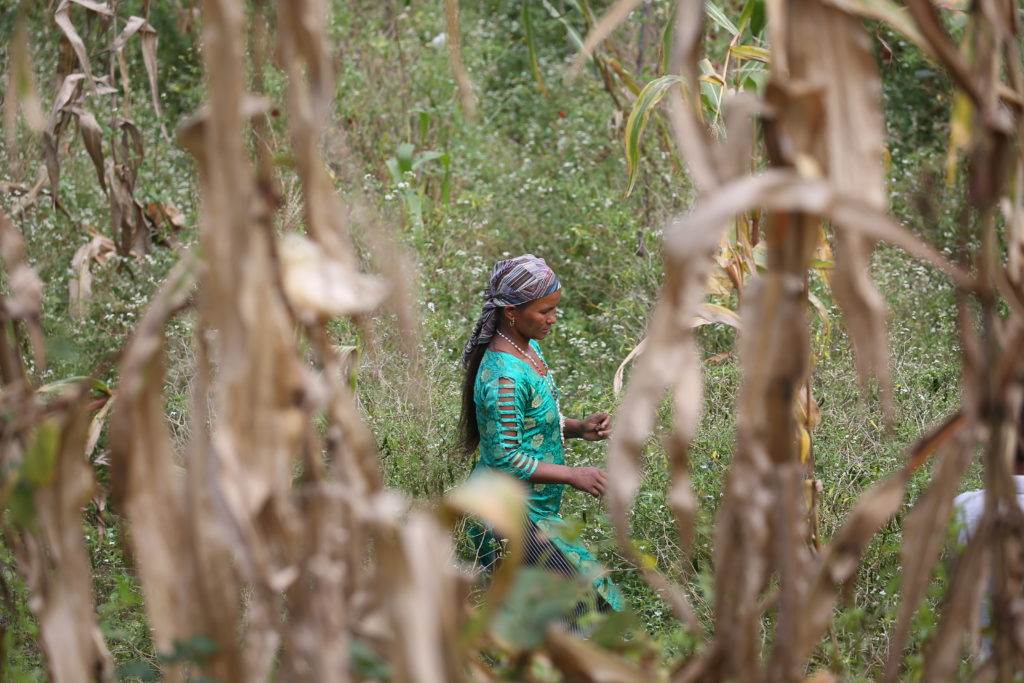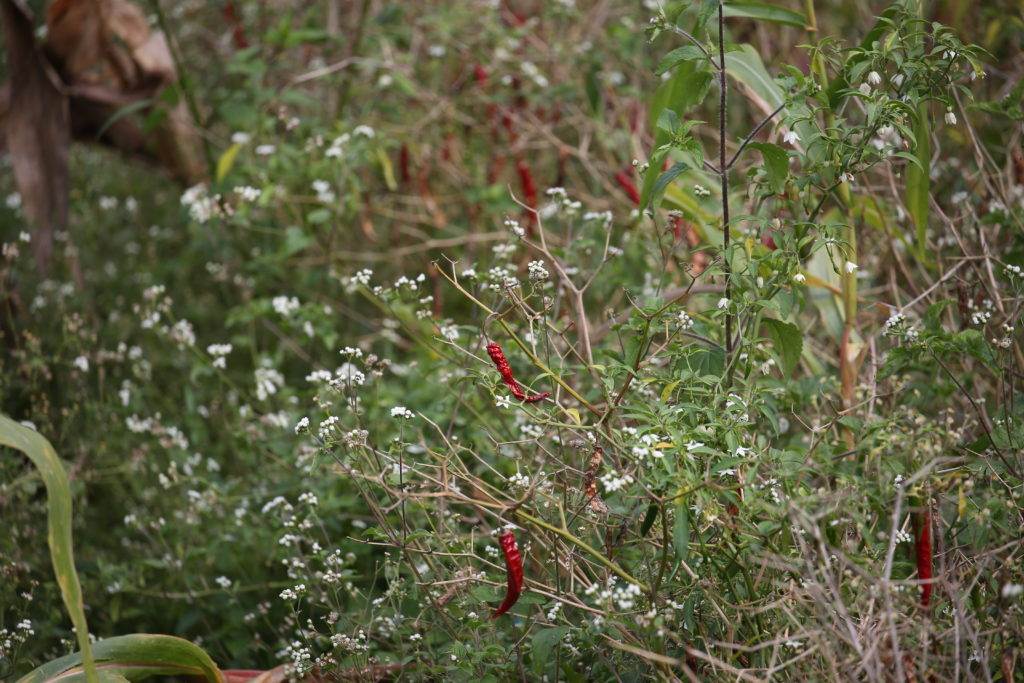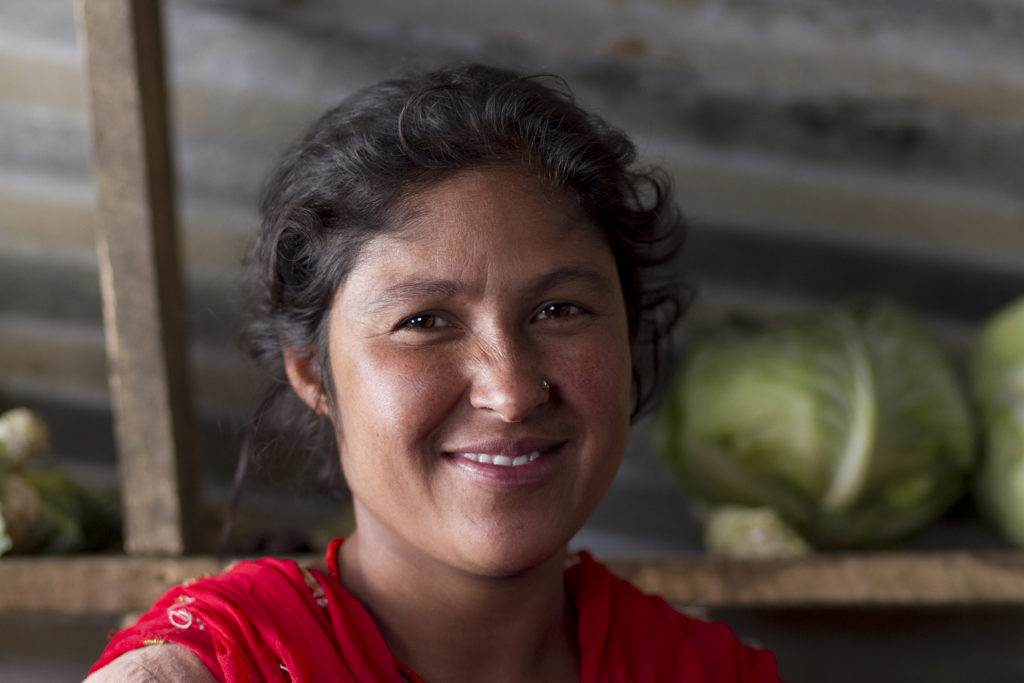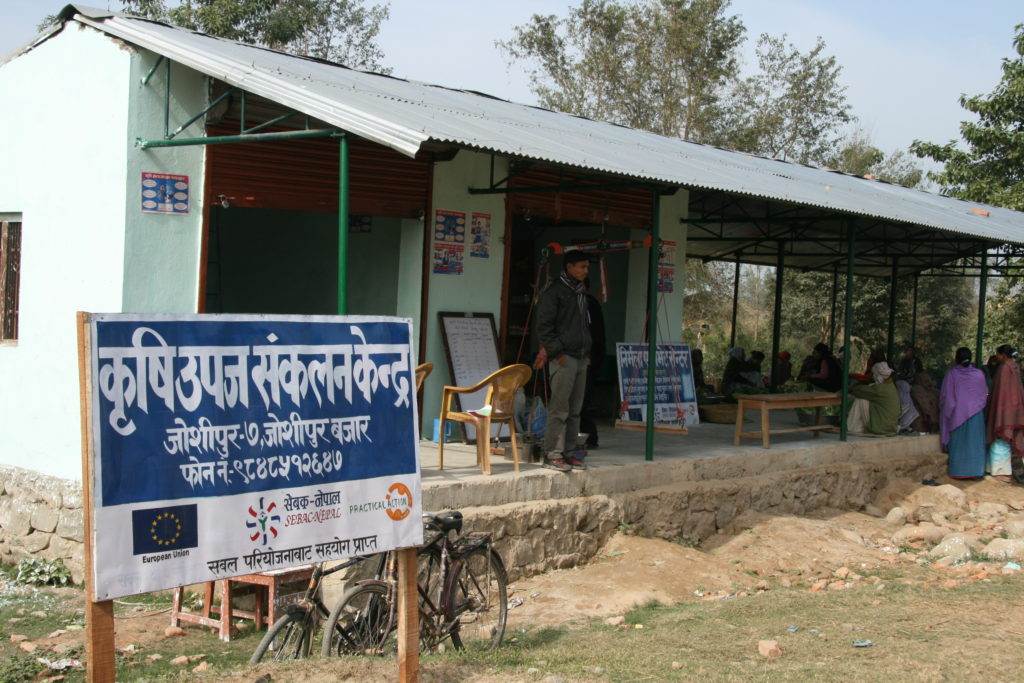How business skills help create a fairer future
New skills for a shifting climate
To create lasting change in Nepal, the solution needs to look to the future and provide communities with the skills they want. Farming communities tend to be aware of what they need to flourish, but are unable to access them. By joining the dots and helping communities improve their business skills, access tools and training and achieve better market access, we can know they’ll be better equipped in the long term. Learning business skills allows farmers to sell their crops effectively, access opportunities to earn more and plan for a happy future.
Communities across Nepal rely on agriculture in order to grow food, provide income and to live – with two in three people in Nepal reliant on farming for their livelihood. But farming in Nepal has never been easy; a lack of market infrastructure and a treacherous topography makes getting goods to market difficult. Rural communities can find themselves cut off for weeks on end during rainy season. There is limited access to education and modern technology. And women, in particular, are often unable to read and write, meaning they’re unaware of the services available to them.
Climate change has made farming in Nepal even more difficult, with unpredictable weather and rapidly shifting conditions resulting in failed crops and wasted labour.
It doesn’t have to be this way, and big change is possible, even in the face of the challenges the shifting climate presents.

Improved market skills could help Junmaya get a fair deal
Our Turning the Tables on Climate Change campaign puts a series of solutions to work through our ingenious five-point plan to create transformative and lasting change.
Let’s make markets accessible
One of the biggest challenges to remote farming communities in Nepal is accessing market information to better help them run their farm as a business and be as profitable as possible. Without markets – and information about prices and produce – farmers will never be able to move from subsistence to commercial, or get a proper return for their crops, their time and their efforts.
Most of the farmers we work with are highly skilled when it comes to agriculture, but they are often not well informed about the cost of crop production due to lack of access to modern mobile technology, electricity and money. Production costs include seeds, fertiliser and labour for weeding, sowing and even ploughing. When these costs aren’t factored in, it can be very difficult for farmers to enjoy a reliable income.
The issue of market access is more acute in for women farmers, who tend not to have access to the same bookkeeping skills as men. As men traditionally leave rural areas to find work in the cities, women are often left in charge of agricultural work and family care. Without training in business skills or support with market access there is no record of how much has been grown and sold and decision making in subsequent years is not based on sound information.
This information helps farmers plan their production better, avoiding gluts of crops that won’t sell, and enables them to plan ahead when buying seeds. If a farmer sees a certain crop is selling well, market information and business skills give them the tools and flexibility they need to harvest what they have and start planting crops that they know will profitable.
Here we explain how we will tackle all of these issues, and work with communities to empower women with better business skills as part of our five-step plan.
To help farmers get their crops to market safely and avoid an arduous journey across tough terrain, we also worked with communities to implement brilliantly simple cable cars that can carry goods in a matter of minutes.
Helping Junmaya get a fair deal
Junmaya is a farmer living and working in the Runtigadhi Rural Municipality in the Rolpa District. Due to limited market access, Junmaya currently can’t fix her prices or bargain to get a better selling price. When she gets to market, she’s at the mercy of local supply and demand and sometimes can’t even sell her produce, so it goes to waste.

Knowing which crops will sell is key to getting profit from farm labour
Junmaya has to go to market without the security of knowing she’ll get a fair price, or any income at all. Without knowledge of the wider market, Junmaya can’t get the money she needs to invest in her future, and the future of her family. She’s locked into subsistence farming, but access to market could bring huge changes for her.
With improved business skills and market access, Junmaya could better value her crops and labour and look outside of her local market for the best price for her tomatoes and chilies, leading to a sustainable income for her and her family.
“I have planted tomatoes and chillies this year, but the local traders said only tomatoes would sell, so I haven’t been able to sell any chillies. All the chillies dried in the field. They went to waste. We couldn’t sell them.
We are still selling tomatoes – a few kilos at a time. But it’s costlier than last year.”
– Junmaya, farmer, Rolpa District
Learning skills for the future
Our collaborative work with farming communities in Nepal is focused on business training for farmers, with extra help provided for female farmers who haven’t had access to a full education. Women were previously denied opportunities as men typically went to urban areas to seek work, leaving women behind.
With the right skills, women in farming communities are able to expand their farms commercially and go into new careers that would’ve previously been closed off.
This training covered a range of business-related topics:
- Basic arithmetic and bookkeeping – Helping farmers value their time and plan their future finances
- Time valuation – Recording methods that allow farmers to put a price on their time
- Managing expenses – Helping farmers to get a clear view of their incomings and outgoings
- Profit tracking – To help farmers ensure they’re getting a fair price for crops and labour.
- Social support – Ensuring women are aware of the government and health services they are entitled to.
Learning important business skills like these allow farmer to accurately bookkeep their expenses and track their profits, building their understanding of the wider market and helping them cost their time up to sure their goods are sold at a fair price. Crucially, it allows farmers to plan their next harvest better, and save and invest for the future. Better literacy and information around what they are entitled to allows them access to healthcare and government services, too.
Communities are stronger together
An important part of the business skills project was working with farming communities to emphasize the importance of their co-operatives, then making co-operatives a central hub for communicating with the wider market.
The co-operatives provide real value, providing a central point for farmers looking to sell into their market and providing real-time market information. Together, the farmers can visit the co-operative to collectively sell their crops and get a fair price through improved purchasing and spending power.
By having a central co-operative for their community, farmers communicate between themselves and the wider market, fixing their selling prices accordingly. Balancing the market in this way brings about huge change, as farmers get increased profits and a more predictable income for the future.
The co-operative also creates jobs. Staff work with each other to catalogue the different vegetables being sold at market and keep track of the wider marketplace in order to make sure everyone gets a fair deal when selling their goods.
Records of the incomings and outgoings of the farmers are kept, so farmers are able to keep an eye on the outgoings on fertilisers, seeds, labours and more – and are eventually able to know how much they made per annum, helping them plan for the year ahead.
A fairer supply chain for farmers
Co-operatives feed into Collection Centres: places where produce can be brought by farmers and sold off. The team working at the Collection Centre are in communication with wholesalers and other markets across the country through radio broadcasts and daily bulletins. Better communication with the wider market allows the farmers’ produce to be sold in bulk amounts to bigger cities, turning a big profit for locals and saving them time, too. Thanks to the co-operatives, farmers are well-informed on the worth of their produce so haggling no longer becomes an issue!
Where once farmers would have had to spend time and energy going to local markets without any guarantee of getting a fair price, this ingenious solution means they can now sell with confidence. Short, robust and local supply chains allow farmers to reliably turn a profit without fear of underselling. In this way we work with small farmers to change the power dynamic between them and big buyers.

Shanti now serves as an intermediator in bridging the gaps between the farmers and the market
“8-10 farmers sell their produce to us daily. And around 8-10 buyers buy the produce from here. In a day, I end up buying and selling around 40 kgs of cauliflowers. We also buy and sell cabbages, tomatoes, pumpkins and other vegetables.
I register the daily sales data and send the remaining vegetables to other markets like Sanfe and Tipada in my own vehicle. I now earn a margin of Rs 2-5 per kg and in a month make around Rs 15000 (around 115 GBP) a month.”
– Shanti Katuwal, Collection Centre owner, Bajura
Skills training helped Shanti build her own business
Shanti Katuwal runs a Collection Centre at Bamka Bazaar in the Bajura District. Shanti was able to start her own Collection Centre with the new business skills she learned through her training, and her centre now links her with the wider market and helps her to make agreements with farmers when buying and selling their produce.
Shanti now serves as an intermediator in bridging the gaps between the farmers and the market. Goods are collected at her collection centre in Bamka Bazaar, which are then transported to the key market areas. Katuwal’s collection centre is centrally located which makes it accessible for both the farmers and the buyers.

Collection centres link rural farmers to the wider market, allowing them to get a better deal for their goods
Improved market access helped Kandhari thrive
Improved business skills, localised supply chains and access to the wider market can change lives. Just ask Kandhari, a farmer in Bajura, who’s now able to farm commercially thanks to access to co-operatives and Collection Centres like Shanti’s. These changes in market information access have seen her vegetable farm flourish.
“This year I just started selling vegetables in the market, I have already made 2-3 thousand [Rupees] by selling cabbages, 2-3 hundred from cauliflower, 5 thousand from radish, along with Palak and coriander.
I find this vegetable farming very profitable. I also recommend my fellow farmers start vegetable farming. I am now able to earn my own money and support my family.”
Thanks to reliable market access and clear information on her incomings and outgoings, Khandrai is able to support her family and start planning for their future:
“From the money I make from selling vegetables in the market, I am able to buy books for my kids and also I send money to my son in Butwal for his education.”
Business skills lead to long-term change
Improving business skills can seem like an afterthought, or even development speak – but to remote farmers around the world, it is absolutely vital. Without them, improvements are either lost, or go to others in the supply chain. This work makes sure those who are feeding the country can benefit from their hard work.
Improved business skills are just one part of the solution. We believe that, through a combination of solutions, big change can happen. And you can help make that possible!

With your support more farmers in Nepal can Turn the Tables on Climate Change, adapt and succeed.
All donations made before 9th March 2021 will be doubled by the UK government – helping to create prosperity and possibility and building a bright future for farming families in Nepal.
Learn more about our transformative work, the communities we work with and how you can get involved with Practical Action.